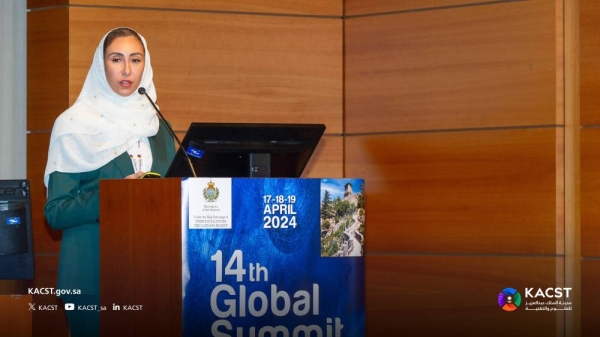The National Bioethics Committee, part of the King Abdulaziz City for Science and Technology (KACST), recently participated in the 14th global summit of national ethics committees held in San Marino. The summit, organized every two years by the World Health Organization (WHO) and UNESCO, focused on health and scientific issues related to bioethics. Representatives from 80 countries came together to engage in discussions and exchange opinions with experts and relevant authorities. Dr. Batoul bint Mohammed Baz, Vice President of KACST for the Health Sector and Head of the Saudi Bioethics Committee, presented Saudi Arabia’s ethics system for research on living creatures at the summit. She highlighted provisions related to persons with disabilities and the involvement of relevant government agencies to ensure their rights and access to services.
Dr. Batoul’s presentation at the summit also emphasized the role of national ethics committees in promoting public participation and dialogue in public health and healthcare. She discussed Saudi Arabia’s efforts to empower people with disabilities by enhancing services in areas such as care, education, rehabilitation, training, and employment. The Kingdom has been working towards ensuring that people with disabilities have access to their rights and are able to fully participate in society. Dr. Batoul highlighted the involvement of government agencies such as the Authority for the Care of People with Disabilities and the King Salman Center for Disability Research in these efforts. These initiatives aim to improve the quality of life for individuals with disabilities and ensure their inclusion in society.
The global summit provided an important platform for countries to share their experiences and best practices in the field of bioethics. It also allowed for discussions on key issues surrounding ethics in research, particularly in relation to living creatures and individuals with disabilities. Dr. Batoul’s presentation highlighted Saudi Arabia’s commitment to upholding ethical standards in research and ensuring the protection of vulnerable populations. By actively participating in international forums such as the global summit of national ethics committees, Saudi Arabia is able to contribute to global discussions on bioethics and learn from the experiences of other countries.
One of the key takeaways from the summit was the importance of public participation and dialogue in the field of bioethics. National ethics committees play a crucial role in facilitating these conversations and ensuring that the ethical implications of health and scientific issues are thoroughly discussed and considered. By involving relevant stakeholders and experts in these discussions, countries can ensure that their policies and practices in bioethics reflect the values and priorities of their societies. Dr. Batoul’s presentation at the summit highlighted the Kingdom’s commitment to promoting public engagement and dialogue in bioethics, particularly in relation to issues affecting individuals with disabilities.
Overall, the 14th global summit of national ethics committees was a significant event that brought together representatives from 80 countries to discuss key issues in the field of bioethics. Saudi Arabia’s participation in the summit, through the National Bioethics Committee affiliated with KACST, underscored the Kingdom’s commitment to upholding ethical standards in research and promoting the rights of individuals with disabilities. Dr. Batoul’s presentation highlighted Saudi Arabia’s efforts to empower people with disabilities and ensure their access to rights and services. By actively engaging in international forums such as the global summit, Saudi Arabia is able to contribute to global discussions on bioethics and learn from the experiences of other countries. The summit emphasized the importance of public participation and dialogue in bioethics, with national ethics committees playing a crucial role in facilitating these conversations and ensuring that ethical standards are upheld.





















